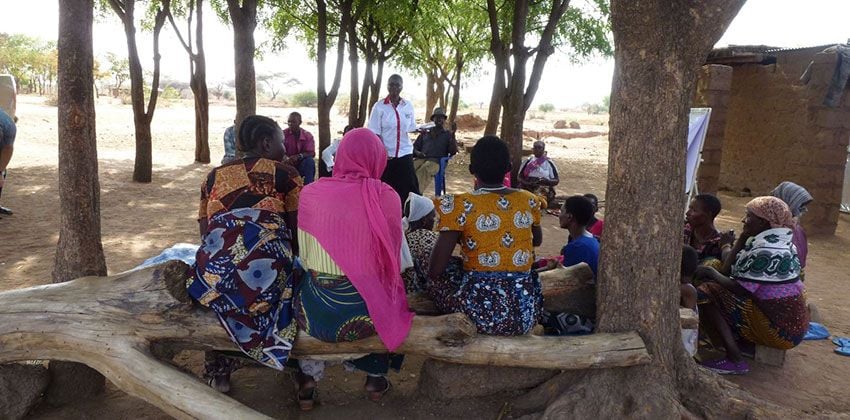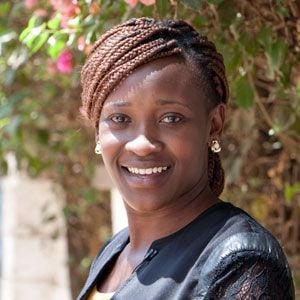Share Content
Article Link Copied
A Program which Serves as an Inspiring Example

In 2016, the Klaus J. Jacobs Best Practice Prize was awarded to ICS-SP in Nairobi, Kenya. The organization’s unique approach focuses on agribusiness and skillful parenting in East Africa in an effort to improve early childhood development, parenting and agricultural practices in rural areas.
The organization’s director, Beatrice Ogutu, spoke with the Jacobs Foundation about how her organization has changed since winning the prize.
How and when did you initially develop the idea for your Skillful Parenting program?
The development of our skillful parenting methodology started in 2009. During that time, the importance of parenting programs in promoting child development and well-being was increasingly being recognized in lower- and middle-income countries, but governments and other stakeholders were, and still are, faced with a lack of local, evidence-based parenting programs that can be effectively implemented at scale. As a result, governments and other actors were investing their limited resources in parenting programs or chose to work with modified versions of parenting programs that are in use in high-income countries. The latter were problematic, as these are not always culturally appropriate and are often too expensive to implement at scale. With Skillful Parenting, ICS SP has demonstrated the importance and feasibility of implementing a parenting program that has been developed in and for African communities. Its content and delivery model have been designed to fit the needs and interests of African families and to use locally available resources and infrastructure.
How have things changed since you won the Jacobs Prize in 2016?
In line with research evidence, we have been able to demonstrate to a number of government and private-sector actors in East Africa and Côte d’Ivoire that the process of child development is multi-dimensional. Skillful Parenting focuses specifically on the early childhood stage, but it acknowledges the importance of continuing investment at later childhood stages to sustain results achieved during early childhood. It also acknowledges that it is important to address parental well-being. This has expanded our visibility as a thought leader and a trusted partner in parenting education support, both regionally, in Africa, and globally. This has increased opportunities for new partnerships and funding. With the award money we have enriched the skillful parenting curriculum with new information on ECD and nutrition and translated the skillful parenting methodology into French. This has expanded our partnership opportunities in francophone Africa, especially Côte d’Ivoire. To increase our reach and impact, we have also built a community of competent team members and paraprofessionals with the knowledge and skills to spread the culture of skillful parenting.
How have parents and children responded to the program?
The uniqueness of the Skillful Parenting program lies in its approach and delivery model. First, it acknowledges the importance of parenting at all stages of child development and is therefore targeted to mothers, fathers and other caregivers with children up to the age of 18. The parents come together in peer groups. Second, the program starts from local perspectives on parenting and family and builds on community structures for delivery and adaptation. As a result, parents find the program easily accessible, can relate to its content, and recognize its added value. This is confirmed by the stories of beneficiaries. As one such beneficiary in Côte d’Ivoire noted:
“The skillful parenting training equipped us with knowledge that will enable us raise our families well. We know the importance of our family. There is now communication, a good relationship, tolerance and love. Everyone knows now his/her roles and responsibilities in the family. We know the needs of our children. We know the stages of child development………….we are thankful for the arrival of this project.”
In 2018, we had a positive impact on the lives of nearly 80,000 children and young people through their parents, schools, community organizations and other platforms.

The organization’s Director, Beatrice Ogutu.
“The skillful parenting program serves as an inspiring example for governments and civil society.”
What partnerships have been key in building the success of the Skillful Parenting Program?
ICS SP has a strong network of operational, research and strategic partners in Africa. It has a good relationship with national governments and takes a leading role in national working groups that focus on early childhood development and violence prevention. We contribute our experience and share evidence of what works, seeking to influence national-level policies and programs in East Africa. Our partnerships with TRECC, the Jacobs Foundation , the Bernard Van Leer Foundation, cocoa companies and IPA in Côte d’Ivoire have been instrumental in contextualizing and expanding our work and impact in that country. In 2018, we partnered with PATH to enrich our skillful parenting curriculum by adding content related to ECD and nutrition. Building on our consolidated capacity, strategic partners and past successes, we are well positioned to continue our growth into 2019.
What achievements are you especially proud of?
The skillful parenting program serves as an inspiring example for governments and civil society, as they seek to strengthen the design of ECD and violence prevention policies and programs, as well as for the private sector, as it works to strengthen the economy and boost productivity. A few years of investment in program development and research have borne fruit. In Kenya, for example, skillful parenting is now a recognized strategy for preventing child maltreatment and has been included in national government guidelines for strengthening child protection systems. In Tanzania, skillful parenting has been recognized by the government as one of four promising strategies to end violence against children; it was featured at the Solutions Summit to End Violence Against Children, which took place in Stockholm in 2018. We are currently part of Tanzania’s national taskforce to develop a national parenting curriculum. In Côte d’Ivoire, we have contextualized, translated and implemented the methodology together with cocoa companies, TRECC and government. The preliminary results indicate that skillful parenting promotes early childhood care and development, strengthens community development and reduces child maltreatment, including child labor incidents. We are proud to note that we have served as a laboratory for what works in promoting ECD and preventing child maltreatment.
How do you see your organization and program developing in the next 10 years?
Attaining scale and sustainability remains key. ICS SP is committed to taking Skillful Parenting to scale in the coming years while maintaining quality and operational excellence. We will use a number of pathways to that end, for example:
We are now focusing on providing evidence for policymakers and decision makers of what works to promote ECD and prevent child maltreatment. We will continue to gather compelling evidence and disseminate information on the benefits of skillful parenting to governments and the private sector, in the interest of encouraging wide-scale adoption of this approach. We are exploring the use of technology to deliver parenting education to parents at scale and pursuing accreditation of skillful parenting so that it can be integrated into training and in-service courses for government social and health workers. This will ensure that competent social and health workers are available on the front lines to support parents and children. We will continue to seek partnerships with the goal of integrating the skillful parenting approach into other economic programs and business activities that work to mitigate poverty and social isolation as a risk factor for early childhood development, child labor and violence. Beyond Kenya, Tanzania and Côte d’Ivoire, we are considering expanding our efforts to Ghana, Uganda, Rwanda and other African countries where the necessary demand and opportunity are present.